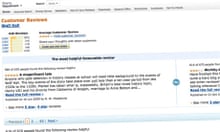In a display of outrage, 49 eminent authors recently signed their names to an open letter condemning three fellow writers, including British thriller novelist RJ Ellory, for having anonymously posted positive online reviews of their own work and criticising rivals. These signatories include weighty literary names more usually expected to protest about war or social injustice, but this time they bristled with righteous indignation at this "fraudulent and damaging" crime.
Why should such popular, successful authors care about a few shabby deceptions buried in the deep, sometimes depressing mines of readers' reviews, a place where readers take time to opine that Dickens can't write or that Bram Stoker's Dracula isn't as good as Twilight? The letter insists that since more books than ever are bought, sold and recommended online, the "health of this existing ecosystem depends on free and honest conversation amongst readers", and pronounces the views of genuine readers as "honest and heartfelt".
This is not the first time that fury has erupted over self-publicists hiding behind false identities. The reputation of historian Orlando Figes was left in tatters after a rival author he'd trashed from behind a pseudonym exposed his false identity, and humiliated him by making public the glowing reviews he'd written of his own books.
By demonising these fakers, the literary world is holding up the discipline of anonymous, amateur internet criticism as a bastion of fair play and decency. At first glance this seems perfectly sound. Who would disagree that deception is the trench dug by the scoundrel, and if writing itself is concerned with the expression of universal truths then it follows we must disown the liars and cheats.
But in a highly competitive area like publishing, which increasingly relies on random online reviewing, what is cheating and what is marketing? Taste in reading and the criticism of writing is undeniably subjective, with most professional book reviews already coloured by individual preference, politics and sometimes, particularly in London circles, by personal relationships.
Is there really a yawning chasm of difference between an irritated author anonymously writing himself a well-constructed review, perhaps to counter vicious personal comments, and a professional reviewer openly writing a glowing review of a novel in a Sunday newspaper because its author was a charming guest at his Sussex beach hut lunch last weekend?
The implication is that Joe Public, even when writing something hilariously stupid, deliberately vindictive or demonstrably uninformed, is always the more trustworthy critic, and that authors peddling their wares must leave crucial online marketplace opinion to be steered solely by these anonymous Solomons.
Selling books in a crowded and fragmented marketplace is by necessity becoming a dark art. Every publisher aches for some marketing miracle to occur, as happened when EL James's tomes of soft porn bilge opened up a completely new and lucrative market of women who had never read anything other than Heat magazine suddenly buying their very first book.
Hence modern publicists work authors hard, parading them like cattle in front of reps at overseas book fairs, propping them behind trestle tables to sign copies for indifferent customers in provincial book shops, and setting up interviews in supermarket trade magazines and in-flight shopping supplements.
Little wonder if some embittered authors feel like taking back the reins of their own publicity. We can certainly take the word of the authors who signed the letter of protest that none of them have ever promoted their own work under a pseudonym, but it would a miracle if none have friends who have anonymously posted a review on their behalf, with or without their permission. What's the difference?
Let's change the game and propose that gifted writers positively embrace anonymous online reviewing, and wrestle it back from posters like "A Customer" on Amazon who thinks that Shelley's Frankenstein "has a sissy plot".
Authors' contracts should henceforth insist they compose and post at least one secret online review of their book, with a royalty increase if it goes undetected for longer than six months. A style challenge for authors and fun for readers searching out the fake. Will Self is exempt. We'd spot you, mate.




